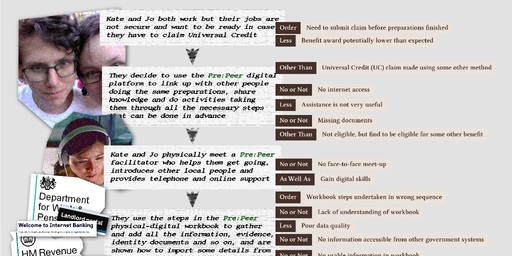
Colin Watson
Digital Civics Doctoral Trainee
My research interests are the effects on individuals and communities by digitisation of national government services. Government service delivery is increasingly shifting online in an effort to increase adoption and efficiency, but citizens have not been central to their design, and strategies to correct difficulties for citizens often address the problem from the perspective of user inadequacies. These matters are particularly pertinent to implementing social protection policies supporting those with higher levels of socio-economic deprivation, who may be in precarious situations, and who are among those most digitally-excluded.
In my MRes Digital Civics project I examined how to help citizens make better use of resource-limited advice and support appointments. In particular I studied how to assist claimants of the Personal Independence Payment (PIP) health/disability benefit gather more accurate and impartial health assessment information to support their claims. This involved co-designing PIP Kit with service users and practitioners, comprising digital and non-digital components, to help people recollect and discuss how health conditions affect their own daily lives and mobility.
My PhD examined the negative effects (harms) on individuals and their communities using, as case studies, two UK transactional welfare benefit services Universal Credit (UC) and Personal Independent Payment (PIP), which deliver policies providing for income and disability-related social protection financial payments respectively,. The extent of digitisation, providing access via self-service remote channels, and pattern of access by citizen claimants is quite different for these, but are the two most commonly-welfare benefits claimed by working-age adults, and were both deemed to be digital transformation exemplars by the government. My research examined how claimant-articulated digital-related harms arise, and whether alternative design choices could reduce harms. This involved the design and evaluation of two digital intervention prototypes to generate further knowledge about how harms arise in service ecosystems.
In addition to my academic publications, other information about my PhD research is published at https://digitalbenefits.uk/

Smartphone Data and Public Health Emergencies: Understanding people’s attitudes to extracting personal smartphone data

HCI HAZOP: A systematic method to identify harms in socio-technical systems

UCX: Enhancing digital welfare public services with independent website augmentation

PIP Kit: Using lifelogging to support disability benefit claimants
2024
Hostile Systems: A Taxonomy of Harms Articulated by Citizens Living with Socio-Economic Deprivation
2024 – CHI '24: Proceedings of the CHI Conference on Human Factors in Computing Systems
Precarious Experiences: Citizens' Frustrations, Anxieties and Burdens of an Online Welfare Benefit System
2024 – arXiv
2021
HCI - H is also for Hazard: Using HAZOP to Identify Undesirable Consequences in Socio-Technical Systems
2021 – ACM SIGCAS Conference on Computing and Sustainable Societies 2021 (ACM COMPASS '21)
Tensions and Mitigations: Understanding Concerns and Values around Smartphone Data Collection for Public Health Emergencies
2021 – 24th ACM Conference on Computer-Supported Cooperative Work and Social Computing (CSCW 2021)
2020
PIP Kit: An Exploratory Investigation into using Lifelogging to support Disability Benefit Claimants
2020 – CHI '20: Proceedings of the 2020 CHI Conference on Human Factors in Computing Systems
Unconsented Data Transfusions: Attitudes Towards Extracting Personal Device Data for Public Health Emergencies
2020 – Mensch und Computer 2020